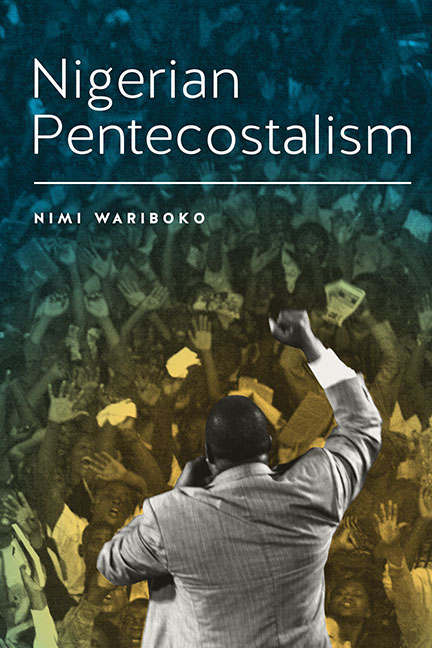Book contents
- Frontmatter
- Dedication
- Contents
- Foreword
- Preface
- Acknowledgments
- Introduction
- Part 1 Origins and Spirituality of Nigerian Pentecostalism
- Part 2 Ethical Vision of Nigerian Pentecostal Spirituality
- 6 Politics: Between Ontology and Spiritual Warfare
- 7 Miracles, Sovereignty, and Community
- 8 Altersovereignty and Virtue of Pentecostal Friendship
- 9 Spirituality and the Weight of Blackness
- 10 “This Neighbor Cannot Be Loved!”: Invisibility and Nudity of the “Pentecostal Other”
- 11 Pentecostalism and Nigerian Society
- Notes
- Bibliography
- Index
11 - Pentecostalism and Nigerian Society
from Part 2 - Ethical Vision of Nigerian Pentecostal Spirituality
Published online by Cambridge University Press: 15 March 2018
- Frontmatter
- Dedication
- Contents
- Foreword
- Preface
- Acknowledgments
- Introduction
- Part 1 Origins and Spirituality of Nigerian Pentecostalism
- Part 2 Ethical Vision of Nigerian Pentecostal Spirituality
- 6 Politics: Between Ontology and Spiritual Warfare
- 7 Miracles, Sovereignty, and Community
- 8 Altersovereignty and Virtue of Pentecostal Friendship
- 9 Spirituality and the Weight of Blackness
- 10 “This Neighbor Cannot Be Loved!”: Invisibility and Nudity of the “Pentecostal Other”
- 11 Pentecostalism and Nigerian Society
- Notes
- Bibliography
- Index
Summary
Cogito ego sum
or
I see, but I am not.
Introduction
Let us end with a response to a question an eminent Nigerian scholar put to me as I worked on this book: How can we use Pentecostalism to understand Nigeria, and Nigeria to understand Pentecostalism? My task here is to show how the data and analyses in the foregoing chapters speak to this concern. But, before I proceed, I must undertake some conceptual bush clearing, for the question as asked is not as clear as it seems at first sight. Since the data of this book are not derived from a generic Pentecostal identity, universal in essence, but a specific variant, then the real question is, How do we use Nigerian Pentecostalism to understand Nigeria, and Nigeria to understand Nigerian Pentecostalism?
I approach even this reformulated query with a certain level of unease. To explain Nigerian Pentecostalism by Nigeria and Nigeria by Nigerian Pentecostalism assumes that both Nigeria and Nigerian Pentecostalism are separate entities. If they are not, then there is no explanandum and explanan. If they are connected (explanan and explanadum are one and the same thing), then any explanation of one by the other is circular and inadequate. In such a case Nigeria and Nigerian Pentecostalism are thus seen only in functionalist terms—at best they translate each other and each helps us to understand the other as itself. However, if Pentecostalism is already penetrated, defined, or redefined by Nigeria and hence the name Nigerian Pentecostalism, where can Nigeria or Pentecostalism stand apart on its own so we can proceed to understand one of them through the undiluted lens of the other?
The preceding question becomes more biting when we unearth the hidden assumption of the scholar's question even in its reformulated form: the metaphor of a mirror, evoking specular experiences. He is asking, How does Nigerian society mirror (reflect) Nigerian Pentecostalism and vice versa? There is some good news in this further refinement of the initial question. The metaphor of the mirror will indeed prove very useful in exploring the vexing complexity, expansiveness, and depth of the question and allow us to conceive the issue of multiplicity in subjectivity, sovereignty, and life as experienced in the absence of conscious mastery of the world.
- Type
- Chapter
- Information
- Nigerian Pentecostalism , pp. 278 - 298Publisher: Boydell & BrewerPrint publication year: 2014

